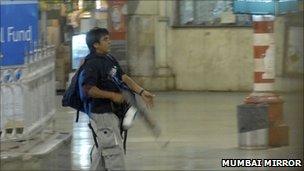Profile: Mohammad Ajmal Amir Qasab
- Published

Qasab mowed people down with an assault rifle at the main railway station
The image of Mohammad Ajmal Amir Qasab clutching his gun at Mumbai (Bombay) railway station became a symbol of the November 2008 attacks that horrified the world.
Qasab, 21 at the time, was the only surviving member of the group that launched a bloody rampage across the Indian city, killing 166 people.
In the immediate aftermath of the attacks, security forces struggled to collect information about the young man.
Only after several months did Pakistan admit that he was one of their citizens, from the province of Punjab.
More specific details are hard to pin down. Indian officials originally portrayed him as a middle-class boy who spoke good English.
But subsequent reports suggested he came from a remote village called Faridkot, where his father sold food.
He had received little education, the reports said, and had spent his youth alternating between labouring and petty crime.
In an interview with Pakistani media, a resident of Faridkot identified Qasab as his son. He said that he had left home four years before the attacks.
"He had asked me for new clothes on Eid [the Muslim festival] that I couldn't provide him. He got angry and left," Dawn newspaper quoted the man as saying.
'Dark figures'
At some point, India says, Qasab came under the influence of the Lashkar-e-Taiba militant group. After training in one of several remote camps, they say, he was hand-picked for the Mumbai operation.
He was captured on camera at the Chhatrapati Shivaji Terminus, a slight figure in combat trousers and a blue sweatshirt, clutching an assault rifle.
He "walked as if no-one can touch him", a photographer who took the picture of him told the court in June.
"Initially I saw two dark figures. They fired towards the ticket window. When they opened fire towards us it confirmed they were terrorists," Sebastian D'Souza said.
Captured after a shoot-out with police, Qasab was interrogated and then charged with 86 offences, including murder and waging war on India.
Prosecutors said he had confessed - but his lawyers then said his statement had been coerced, and it was retracted.
His trial began in March 2009 and at first, correspondents say, he appeared relaxed. He smiled periodically and occasionally joked with officials.
His defence had attempted to argue that he was under 18 and so a minor. Asked in May 2009 to confirm his age, he provoked laughter by stating that if prosecutors had believed him then he would not now be in court.
Later his demeanour grew more serious, even erratic.
When a 10-year-old girl injured in the attacks identified him in court, witnesses said he looked grave.
Call for leniency
In May 2010 Qasab was sentenced to death by a special court which found him guilty of many charges, including murder and waging war on India.
Judge ML Tahaliyani said "he should be hanged by the neck until he is dead", adding that he had lost his right to "humanitarian treatment".
Qasab's lawyer called for leniency, saying his client had been brainwashed by a terrorist organisation and could be rehabilitated.
Qasab appealed against the sentence, and the High Court in Mumbai began hearing the case in October 2010.
He initially attended proceedings through a video link for security reasons.
But after two hearings he demanded to attend court in person. The request was refused and he was reprimanded for his outburst, following which he failed to appear by video link.
The Mumbai High Court rejected his appeal in February 2011 and in July of that year, Qasab took his appeal against his death penalty to the Supreme Court.
In a statement submitted in court, Qasab said that the prosecution had "failed to prove beyond a reasonable doubt the charges against me". He said he "may be guilty of killing people and carrying out a terrorist act but I am not guilty of waging war against the state."
On 29 August 2012, the Supreme Court rejected his appeal and upheld his death penalty. He then appealed unsuccessfully to the president for clemency.
He was hanged in prison in the city of Pune on 21 November 2012.
- Published21 November 2012